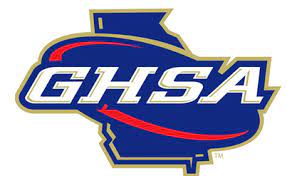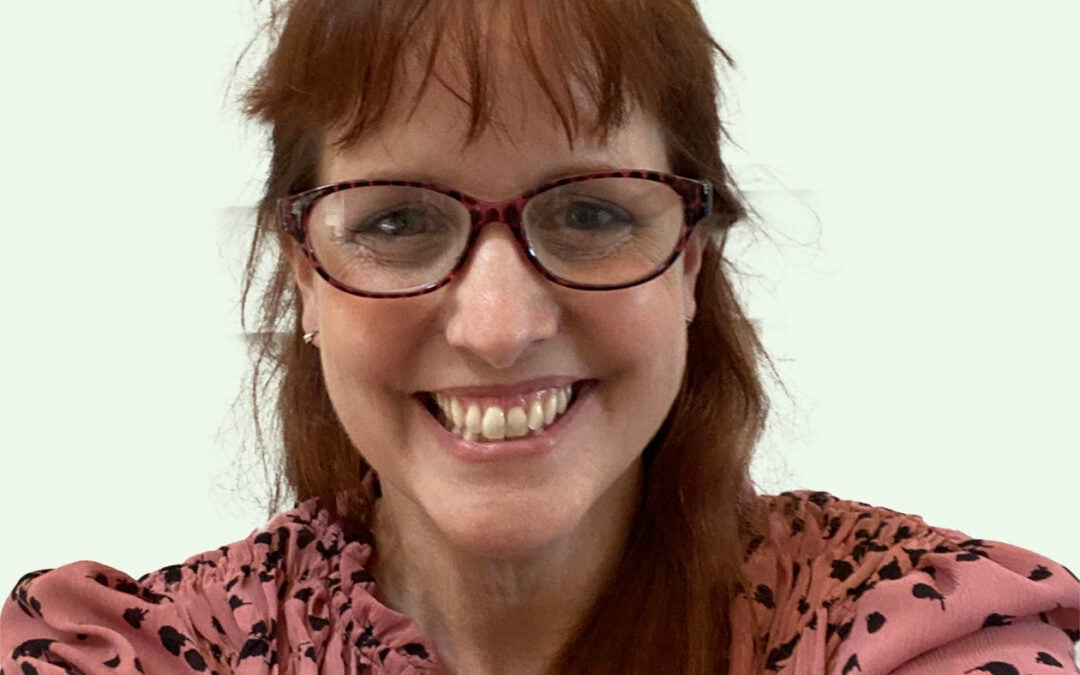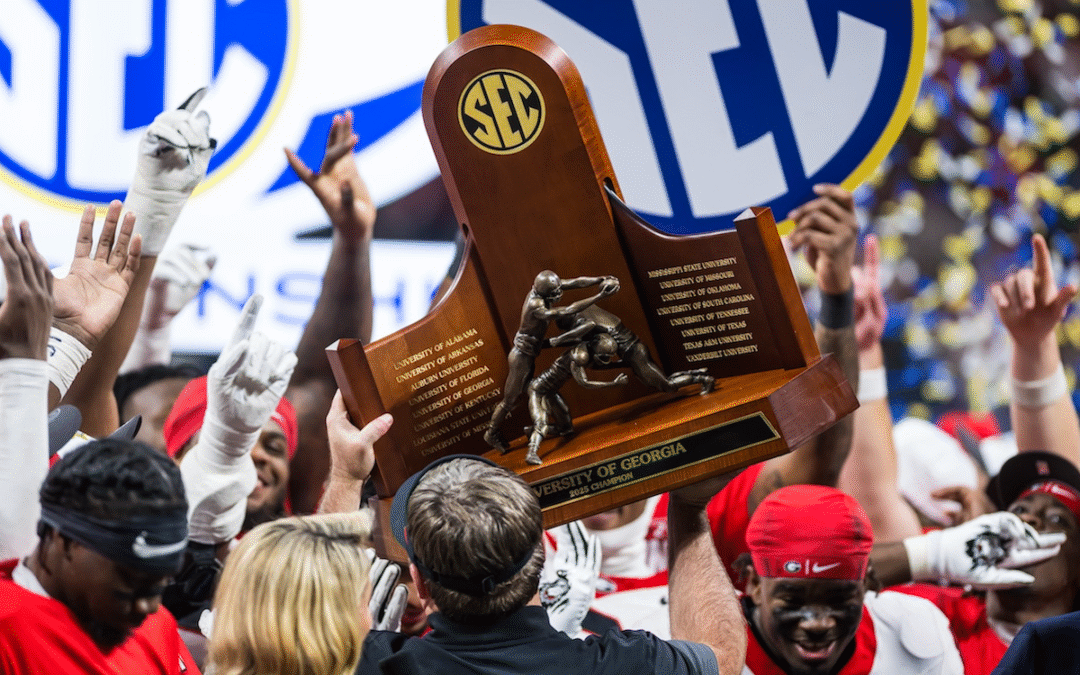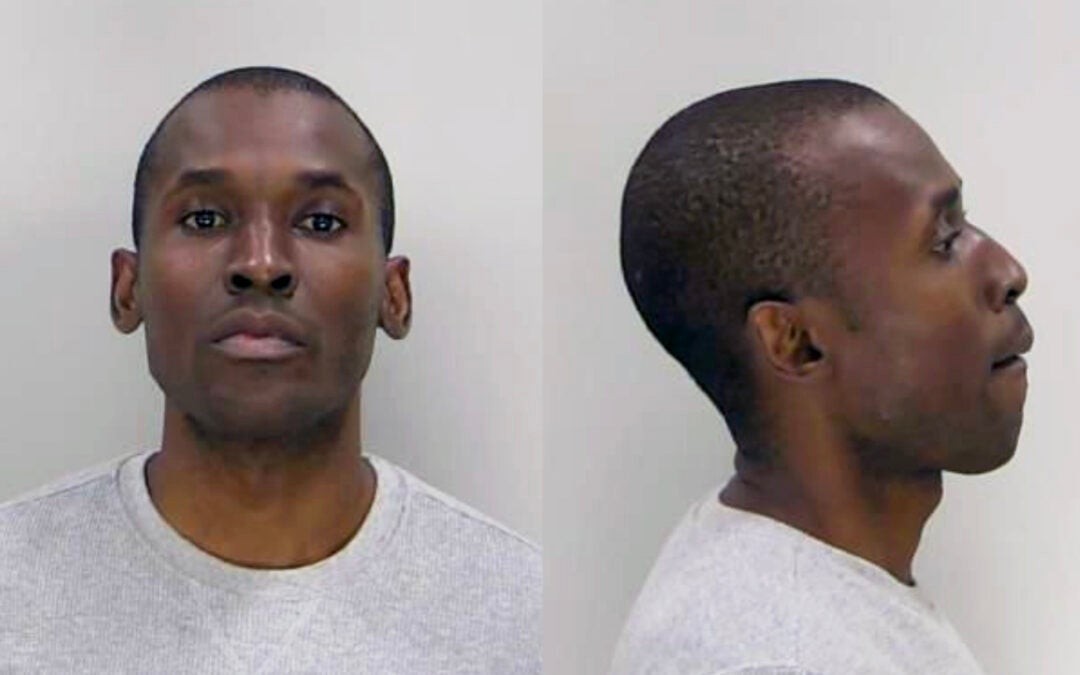When the Georgia High School Association voted during a Monday morning meeting to approve a bylaw that allows high school athletes in the state to profit from name, image and likeness (NIL) opportunities, it got the wheels of thought turning in the heads of some Augusta-area coaches.
The chief question they’re asking is, “What does it all mean?” And that question isn’t directed only to Georgia’s high school athletes, but also coaches, school administrators, trainers and the parents of high school athletes.
Throw in what will be undeniable implications for club and AAU sports programs, and it seems safe to say that what the GHSA did Monday during its fall meeting has triggered arguably the most seismic paradigm shift in Georgia high school sports in decades.
The vote came during the GHSA’s regular fall meeting, and the bylaw amendment was overwhelmingly approved by a 65-10 margin. It means that each individual GHSA athlete owns his or her own name, image and likeness, but that any form of compensation received through NIL contracts or agreements cannot infringe upon any intellectual property of the GHSA or its member schools.
Coaches like Grovetown boys basketball’s Darren Douglas can’t help but to imagine what this means to future high-profile athletes that may come through his program. Monday’s news may have also prompted a few “what-ifs.”
Just as the 2023-24 school year was beginning, Douglas saw 5-star prospect Derrion Reid depart Grovetown for Prolific Prep in Northern California. While some speculated Reid made the move due to NIL money coming his way, the 6-foot-7 senior denied those speculations.
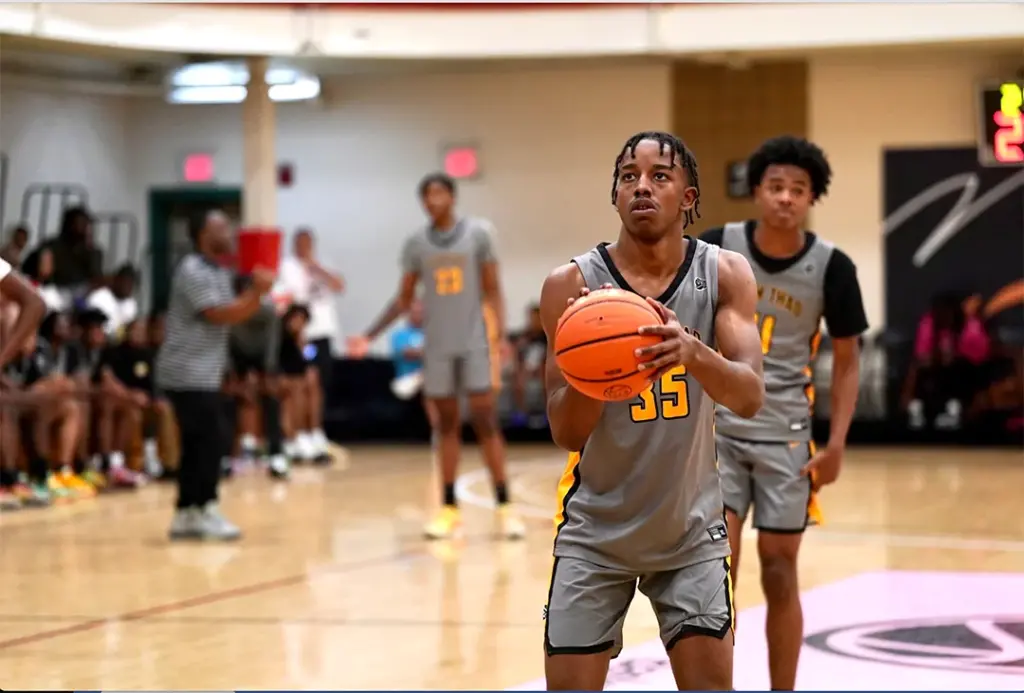
Douglas, however, says the GHSA’s new ruling may make it easier to keep talents like Reid from leaving Georgia at the height of their high school popularity, but it is far from a magic wand.
“I think it’s a step,” Douglas said Monday after the news broke. “The next step is the over-policing of how much the kids can work out of season, and things of that nature. When a kid has a dream, and the governing body puts limits on how they can work towards that dream, and there are places that only push and don’t limit, those places will still have a leg up. I do think this NIL decision will stem the tide for a bit, as far as making athletes feel like they have more options at home, but there are so many more changes needed to save public school sports in my opinion.”
Navigating NIL’s ‘uncharted territory’ is crucial
Evans head football coach Barrett Davis has a highly touted, prized recruit type in his own program in 4-star offensive lineman Mason Short. The 6-foot-5, 305-pound tackle committed to Alabama back in April.
Davis calls Short a bit of a “throwback” in that he tries his best to shun the attention that comes with his prominence. He also says that his star player remains solid in his pledge to the Crimson Tide. But having such a highly regarded athlete in his program has definitely made him think about the implications the state’s new NIL policy will have, not just on kids, but coaches and school staff.
“It’s uncharted territory for both these kids and these high school coaches,” Davis said. “For me, and us as coaches, educators and teachers, it’s like another loop we now have to go through. It’s an added on thing that we have to try and monitor and navigate.
“With regard to a player like Mason, we know having that kind of kid is definitely good for your program. I’m not sure how much we did to make it happen, because he just sort of came in here as a freshman as a massive human being, and he accepts coaching. But his attention also brings attention to other guys on our team that maybe wouldn’t have gotten as many looks otherwise, so you can see where these sorts of things can benefit your program.”
Davis is concerned, though, that adding in the opportunity for high school athletes to make money during their high school careers could create some unintended consequences if things aren’t handled properly.
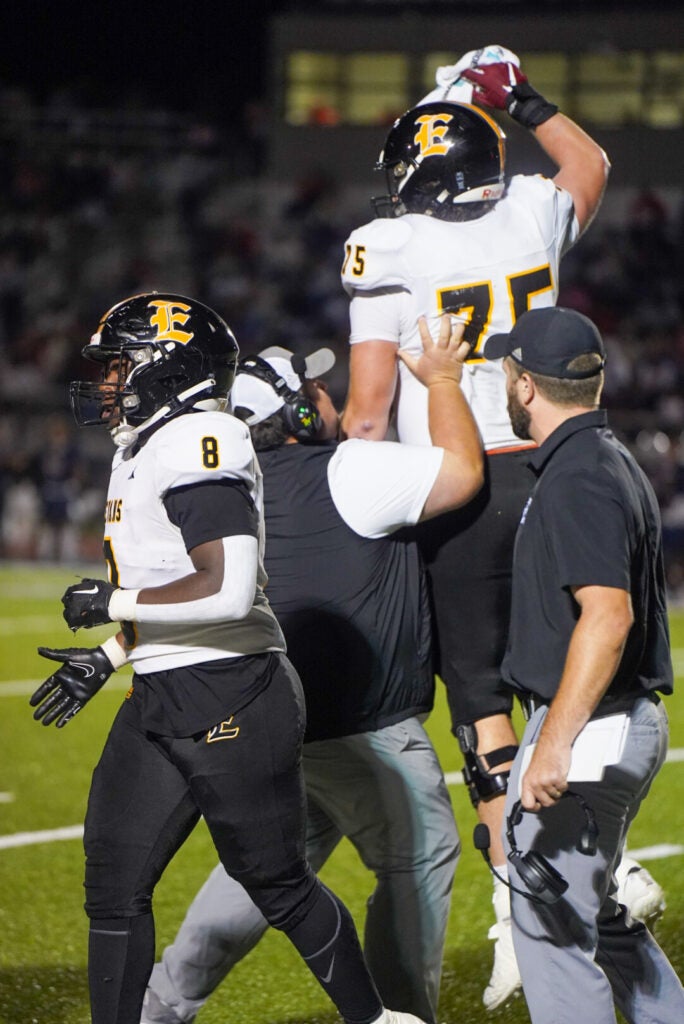
“At this point, you’re not gonna keep this stuff out of Georgia,” Davis said. “You know it was coming. I do think the GHSA does a good job of doing its due diligence on things like this, and comparing what other states do. I think this can help kids, especially in bigger cities where there’s more businesses and things like that. But I also think, man, these kids have enough issues in their lives already. These kids need to be able to enjoy playing for their high school teams, and not worrying about some of these other things. I’m not against it, but it just makes you wonder about the things that could happen, and you wish you could just let a kid focus on playing high school ball.
“But times have definitely changed over the last 15 to 20 years as far as coaching goes, and these kinds of things are unavoidable, I think, at this point.”
GHSA executive director Dr. Robin Hines says one thing that won’t change, according to how the new bylaw has been drafted, is the GHSA’s commitment to making sure the lines between state sanctioned competition and a player’s ability to capitalize off of his or her own status or popularity are not blurred.
“I like what Oklahoma has done,” Hines said. “It’s simple and to the point. Maryland did a good job with theirs. I like what Pennsylvania has done. Rhode Island has a good policy, and when you break it all down, it’s really not that much to it. You can allow for athletes to own their own name, image and likeness and capitalize off of that, but you can’t use the intellectual property of the association or the school.”
Dissecting the details of GHSA’s NIL policy
Simply stated, Georgia high school athletes can capitalize off of their own status as an athlete — and the benefits, financial and otherwise that come with that — as long as GHSA school logos, GHSA school names, GHSA’s name and logo or any GHSA sponsored competition footage is not being used.
These stipulations place no restrictions on what student-athletes do outside of the GHSA, i.e. club and AAU sports.
“We don’t control anything that has to do with club sports or AAU sports,” said GHSA executive director Dr. Robin Hines in a September interview with The Augusta Press ahead of Monday’s vote.
Georgia now becomes the latest of 30-plus states to adopt NIL principles for its high school athletes. When Hines was looking into the matter for the GHSA, he cited already-existing NIL policies from several states that he said guided his thinking regarding what a NIL policy for high school athletes should look like in Georgia.
Hines said the GHSA’s decision on NIL was not made lightly, nor without a generous investment of time and research. He also stated that understanding what NIL is not is just as important for athletes, coaches and parents of athletes as knowing what it is.
“We started the research process about a year and a half ago, and when I spoke about it, we made sure to get comments from member schools and coaches,” Hines said. “We knew we needed to be more educated about what it actually is. We also know that what it is not is pay for play. I think that’s a big misconception people have with all this. And [our policy] will build on the premise that every individual owns their own personal name, image and likeness and has the right to publicity because of that.”
Other highlights of the approved bylaw include a stipulation that requires athletes to report any agreed upon NIL contracts or agreements to their high school’s principal or athletic director within seven calendar days after striking the deal.
Also, the high school athlete will be prohibited from wearing any school apparel or equipment, including school mascots or team nicknames, and GHSA member school facilities are off limits for anything connected to the athlete’s NIL deal.
Additionally, GHSA athletes are not allowed to enforce items that are in conflict with a GHSA member school’s local district policy, i.e., alcoholic beverages and products, tobacco products or controlled substances.

Those stipulations become crucial, local coaches say, toward mitigating the risks that come with the new opportunities.
“With something like this, there’s always going to be danger that goes along with the reward,” Douglas said. “Human nature is going to make any situation where you can potentially monetize it, it’s going to make any situation like that potentially dangerous. You’ll have jealously, people stepping in and trying to take advantage of uneducated people. That’s why, for me, educating myself the best way I can is important so that I can help keep it real with parents and be honest in helping them navigate this new frontier.”
Westside boys basketball coach Jerry Hunter sampled the words of 1990s rapper Notorious B.I.G., a.k.a. “Biggie,” to summarize his feelings.
“It’s like Biggie uttered, ‘More money, more problems,’” Hunter said. “I do think at this point, it was inevitable. But people only see, hear and talk about the money aspect of the situation. However, no one discusses the contractual agreements the athletes would have to agree upon and how some of that may affect their performance, whether for good or bad.”
Given the status of his back-to-back state championship winning basketball program, Hunter said he realizes the necessity of quickly getting “up to speed” on this new financial frontier for high school athletes. Both he and Davis hope that schools can find ways to include more financial literacy into their curriculums to help offset problems that could come through ignorance.
“Professional athletes normally hire someone to count their money, to discuss and advise on financial matters,” Hunter said. “I’m sure these individual’s services are not pro-bono. At the same time, I’m sure there are situations where a kid’s income may assist with helping their family, and I get that.”
Said Davis: “A lot of these kids have two-parent homes, or they’re just raised right over all. They get good guidance. But some of these kids don’t have that at home. And now you factor all these financial deals into that with a 17 or 18 year old kid trying to make all this money, that’s just tough to do. Some high schools offer financial and life skills classes. Maybe that’ll have to increase now with these new additions.”
Hines also said he’s wary of the pitfalls that could await uninformed athletes and parents who are thinking more of immediate financial gratification than long-term financial health. He tried to implement his concerns into the way the GHSA’s bylaw is articulated.
“The thing that concerns me most is kids and parents needing to be educated and responsible for it all,” Hines said. “I’ve heard so many stories of athletes signing a contract with someone for multiple years, and they go through high school and have a chance to get into the pros and get that multi-million dollar contract, but whoever signed them in high school has them locked in for 15 years while getting 30 percent of whatever money they make as a professional.
“I’ve seen how any money received could affect financial aid for an athlete getting ready for college. But the premise that everybody owns their own name, image and likeness, even at the high school level, and everyone should own the fruits of their own popularity, I subscribe to that. Why would we discriminate about that?”
More positives than negatives to GHSA’s NIL
It seems most believe the potential pros can outweigh the cons overall. And when Hines spoke about it in a September interview with The Augusta Press, he said that if the vote passed, the new policy would become effective immediately. Which means the learning curve now must speed up considerably.
“I’m kind of excited, honestly,” Douglas said. “It’s just another layer of development that we’ll get to do here with Grovetown basketball. We can teach these young men how to maximize their abilities and manage their money. To me, it’s all about preparing our kids for the next level in all areas. If we can maximize NIL in high school, let me find out how to use that to help our kids. Let that be an open door to teach them now about stock options, investments and things like that. When you get dropped in the water, they tell you don’t fight against the tide. Just go with the tide, and that’s what I think we need to do here, so it excites me.”
Both Davis and Hunter expressed intrigue about the positive possibilities NIL will bring to Georgia high school sports. But, like Davis, Hunter is hopeful that adding this layer to an athlete’s high school experience will not backfire.
“When you’re dealing with youth, they’re already plagued with enough problems as it is,” Hunter said. “But we’re here now. Therefore, coaches, administrators, superintendents and parents, let’s all be prepared to be involved in the solutions.”

